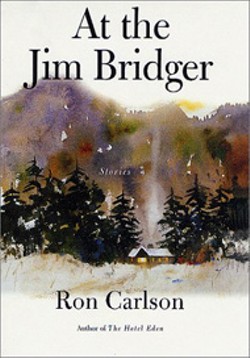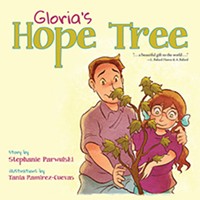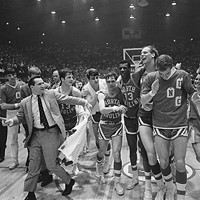Subtle Gems
Wireman reflects on education / Carlson finds depth in the ordinary
This is a collection of essays by one of the great educators of our time, but a man so familiar to the people of Charlotte that it's easy to forget his
standing in the world. Billy Wireman will step down this spring as president of Queens College (soon to be called Queens University of Charlotte), a post he has held since 1978. During that time, he has built an international reputation as a visionary with his feet on the ground -- a champion of multi-cultural education who understands clearly that the world is shrinking.
Wireman has come a long way from Quicksand, Kentucky, the place of his birth. He's a former Marine who became a professor of physical education, and made his way through the ranks, moving from teacher to dean to director of development before becoming, at the age of 35, the youngest college president in the country. His first assignment was Florida Presbyterian, now Eckerd College, in St. Petersburg; after 10 years he moved on to Queens, an institution that was teetering on the edge of bankruptcy.
Wireman turned it around. He doubled the endowment, increased enrollment, began an evening school, started a program of intercollegiate athletics, and set up a graduate school of business. With the help of his colleagues, he created a core curriculum in the liberal arts in which he tried to end the fragmentation in learning -- that curious reality at many universities in which professors of English or philosophy or science have no idea that other disciplines exist. Wireman is convinced that an educated person in the 21st century has to look for connections -- the links, for example, between technology and ethics, commerce and art, politics and religion -- all those complementary angles of vision that people can use to understand the world.
Throughout his career, there has been a practical edge to Wireman's
ruminations, a quality of thinking both dreamy and concrete, and the essence of it has been captured here. There are snippets from speeches, and articles from journals and daily newspapers, all of them artfully and tenderly assembled by two of Wireman's colleagues, Dick Goode and Bob Whalen.
Goode is a professor of English at Queens, Whalen a historian, and both are ardent admirers of their boss. That isn't always the case with professors and presidents, but their relationship reflects that quality of informality that has been at the heart of Wireman's leadership. In this collection of his work, Goode and Whalen have not set out to plow new ground. It's not that Wireman has thought of things nobody else has; he is more of a synthesizer than a cutting edge theorist, but what comes
through in this career's worth of writing is a depth of earnestness, a deep
idealism, about the nature of his calling.
"Education at its deepest levels," he writes, "is a search for enlightenment, understanding and meaning. Search is an active verb and
implies struggle and the unknown. The more we learn the more we find there is to learn -- so we bring a certain humility to our academic and intellectual pursuits. There is joy and mystery, awe and wonder and a certain amount of just plain hard work. . .
"We are living in revolutionary times," he continues, "and the most revolutionary idea of all is that we can be free, that we can make a better life."
Such is Wireman's self-portrait of his work -- a collection of wisdom both eloquent and obvious, a fitting memorial to a well-spent career.
-- Frye Gaillard
The nine short stories in Ron Carlson's newest collection are full of the kind of details of daily living that make them believable and authentic; yet, in all of them, there is something of the wonder, mystery, and awful beauty that most can sense or feel, but not verbalize. The setting for these stories is in the western United States, but it could be almost anywhere. The characters are, for the most part, ordinary people; yet there are special, if not extraordinary, things in their lives and personalities that simmer to the top as the stories move along.
In the first story, "Towel Season," a mathematical genius is tempted and finally persuaded to quit thinking so hard about the special project he's committed to, and to enter the realm of the ordinary people who fill the world around him, and distract him -- the husbands, wives, and children of a typical American suburban neighborhood who gather each evening for cookouts, beer, and swimming. He succeeds at assimilation, but that's not necessarily good since it's not true to the character. Carlson shows that he understands there are really few constants in life; and what is good one day is not good the next.
In the title story, "At The Jim Bridger," a married man who's been on a camping trip with a woman who is not his wife takes the woman to the Jim Bridger Lodge where he encounters a man whom he had saved from freezing to death on a previous camping trip. It's the story of the freezing man and how he saved him that is partly responsible for the other woman being with the main character; yet on encountering the same man in a different situation, and after bringing the saved man and the other woman together for a dance, the truth emerges: "Certain decisions are made in daylight and certain decisions are made in darkness. Winter has its own decisions, as do spring and fall. . .The decision to use his story as he had, to show it to her, burn it like a match, had led to this new darkness and the longer night."
The profundity of these stories is matched by a sometimes subtle and sometimes not so subtle sense of humor; either way, there is much laughter to be had in these stories. In "The Clicker At Tips," two former lovers meet in a sports bar and as the story of their relationship is retraced, the woman torments a group of yuppies by changing channels on a television. In "The Ordinary Son," the non-genius in a family of geniuses learns to appreciate life and the world around him despite his lack of smarts. In "Evil Eye Allen," a teenage magician uses his power to seduce the prettiest girl in the world, also a classmate, with regrettable results. Two high school football players in "At Copper View" travel to another town so that one of them can date the homecoming queen, and discover how strange and different a few miles' distance can make. "The Potato Gun" is a beautiful story that sums up the conflict all parents encounter between being people and being parents. In "Gary Garrison's Wedding Vow," a young woman makes the honking of geese at a certain time during her wedding a prerequisite to completion of the ceremony. A young man finds himself caught up in defrauding a casino in "At The El Sol." Later he falls in love with the girlfriend of the mastermind of the fraud, a vengeful killer.
All these stories are immediately engaging. They create places and people that are recognizable, and are written with believable dialogue. Yet there is also something magical and marvelous about them: a great, sweeping feel that is usually found in novels or epic poetry, a sense of history, of things gone before, and things yet to come -- and an awareness of a greater truth, an understanding, if not a meaning, of what it is to be human. That Carlson sets his stories in our own time and fills them with things,and people that we can all recognize and know, makes the connection to contemporary readers that much stronger. Comparisons can be made to Raymond Carver, Larry Brown, and Charles Bukowski in the easy, understanding flow of language, but Carlson has his own style that has earned him high praise and regard as one of our leading writers of short stories. Ultimately, it's Carlson's gift for telling a story well, and his ability to embellish, digress and yet return to where he started the story, that makes these memorable -- and also the probability that somewhere, in at least one of these stories, you will see yourself.
-- David Childers
Latest in Books
Calendar
-
Derek Hough - Symphony Of Dance @ Ovens Auditorium
-

NEW WINDOW GALLERY-Pat Rhea-ACRYLIC PAINTINGS-April 05-30 2024 VALDESE, NC 28690 @ New Window Gallery/Play It Again Records
- Through April 30, 12 p.m.
-

"Blood Residue Analysis of Paleoamerican Stone Tools in the Carolinas" @ Native American Studies Center
- Fri., April 26, 12-1 p.m.
-

ARTS RENAISSANCE, a GALA supporting the ARTS in South Carolina @ the Columbia Museum of ART
-
 The Piano Guys @ Ovens Auditorium
The Piano Guys @ Ovens Auditorium
-
The death of CAST 5
What really happened to Charlotte's beloved experimental theater company?
-
Jessica Moss Makes the Gantt Center a Safe Zone for Local Artists 2
Flipping the script
-
Charlotte ink 7
Behind the pain with a trio of the Queen City's finest tattoo artists











